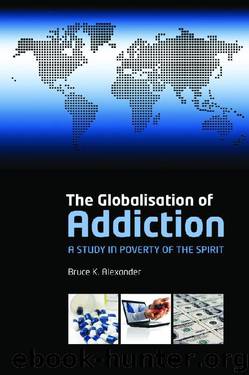The Globalization of Addiction by Bruce K. Alexander

Author:Bruce K. Alexander [Alexander, Bruce K.]
Language: eng
Format: epub
ISBN: 9780199230129
Publisher: OUP Oxford
Published: 2008-07-02T22:00:00+00:00
In addiction treatment, eclectic spirituality does not put the emphasis on the relationship between the addicted person and God, as in the Christian tradition, or on recovery from addiction, as in AA. Rather, the emphasis is on cultivating the relationship between the addicted person and the infinite cosmos, which is the ultimate home for all beings. Addiction is understood neither as a disease nor as a form of wickedness. Rather, people are seen as turning to addiction and other harmful behaviours because they find so little to fulfil their individual spiritual needs in everyday life. Spiritual helpers do not judge the addicted person morally, nor push for change. Instead, they attempt to share and accept the addicted person’s life in the deepest possible way. Through unconditional positive regard and patience, the helper offers balm to the wounded spirit, and cultivates a sense of self-worth and transcendent belonging that will enable the addicted person to overcome addictive cravings—when and if this becomes the right choice for him or her. All people are worthy of respect and freedom, and providing these in abundance will lead people to make the best choices that they possibly can. It is assumed that therapy of this sort will spiritually enrich the spiritual helper at the same time that it improves the life of the addicted person.
This faith does not focus exclusively on addiction and does not necessarily require a spiritual helper. It is often embraced by individuals—addicted or not—who pursue serenity with the aid of self-help or with the inspiration of public speakers and workshops that promulgate eclectic spirituality around the world. The published stories of people’s journeys from misery to eclectic spirituality comprise a radiant literature.
This faith is called eclectic spirituality in this book because it can be linked to a great variety of spiritual traditions. When expressed in Biblical language, it can be seen as a variety of Christianity,67 although its ecumenical and non-judgemental character sets it apart from Augustinian forms of Christianity and its self-absorption sets it apart from Christian liberation theology, which is oriented towards intervention in social and political affairs.68
Eclectic spirituality is often identified with exotic traditions; for example, Buddhism,69 Hinduism, Roman Stoicism and Epicureanism,70 and Existentialism. It is often seen as intrinsically Eastern. It is sometimes portrayed as a flower child born in the hippie upheaval of the 1960s and in the thinking of American humanistic psychologists of that era, especially Abraham Maslow and Carl Rogers.71 It is sometimes expressed in the terminology of advanced modern science.72
Eclectic spirituality has appeared so many times in the course of history that it may qualify as an archetypal way of understanding the world. It seems to be at a peak of influence now, as it was in other historical periods, including the Roman Empire before Christianity became its most important faith. Three forms of eclectic spirituality will be discussed in this section: an ancient Roman form expressed in the Meditations of Marcus Aurelius, a current Buddhist form as practised within today’s Vipassana meditation, and a contemporary professional psychology form developed by William R.
Download
This site does not store any files on its server. We only index and link to content provided by other sites. Please contact the content providers to delete copyright contents if any and email us, we'll remove relevant links or contents immediately.
The Hacking of the American Mind by Robert H. Lustig(4386)
Right Here, Right Now by Georgia Beers(4217)
Fingerprints of the Gods by Graham Hancock(4006)
Goodbye Paradise(3812)
Bad Pharma by Ben Goldacre(3428)
Happiness by Matthieu Ricard(3051)
The Social Psychology of Inequality by Unknown(3034)
More Language of Letting Go: 366 New Daily Meditations by Melody Beattie(3031)
The Plant Paradox by Dr. Steven R. Gundry M.D(2627)
Drugs Unlimited by Mike Power(2596)
Confessions of a Shopaholic by Sophie Kinsella(2376)
Borders by unknow(2319)
Make Love Not Porn by Cindy Gallop(2110)
Dry by Augusten Burroughs(2102)
Stop Being Mean to Yourself: A Story About Finding the True Meaning of Self-Love by Melody Beattie(2006)
Getting Off by Erica Garza(1932)
Belonging by Unknown(1861)
Yoga and the Twelve-Step Path by Kyczy Hawk(1836)
Unmasking Male Depression by Archibald D. Hart(1810)
